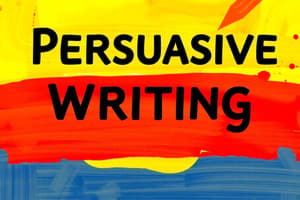Podcast
Questions and Answers
What is the primary goal of informative writing?
What is the primary goal of informative writing?
- Presenting facts without personal judgments (correct)
- Using emotional appeals to sway opinion
- Expressing personal opinions
- Persuading readers to take action
Which type of writing aims to convince readers to agree with a particular viewpoint?
Which type of writing aims to convince readers to agree with a particular viewpoint?
- Informative writing
- Analytical writing
- Persuasive writing (correct)
- Argumentative writing
What strategy is recommended for crafting effective informative pieces?
What strategy is recommended for crafting effective informative pieces?
- Avoid citing any evidence as it may confuse readers
- Use emotional appeals to keep readers interested
- Include personal opinions for better engagement
- Organize material logically using headings and lists (correct)
Which writing type involves presenting clear explanations based on reliable sources?
Which writing type involves presenting clear explanations based on reliable sources?
What distinguishes persuasive writing from other types of writing?
What distinguishes persuasive writing from other types of writing?
Which writing type seeks to educate readers by presenting clear explanations without personal judgments?
Which writing type seeks to educate readers by presenting clear explanations without personal judgments?
What is the primary aim of argumentative writing?
What is the primary aim of argumentative writing?
In argumentative writing, why is it important to analyze opposing perspectives?
In argumentative writing, why is it important to analyze opposing perspectives?
What is a crucial step in analytical writing?
What is a crucial step in analytical writing?
How can writers improve their communication skills under various circumstances?
How can writers improve their communication skills under various circumstances?
Why is it important for writers to show empathy in their writing?
Why is it important for writers to show empathy in their writing?
What is the significance of choosing relevant examples in argumentative writing?
What is the significance of choosing relevant examples in argumentative writing?
Flashcards are hidden until you start studying
Study Notes
Writing Techniques
Writing is a complex skill that involves more than just conveying information from point A to B; it's also about how you convey that information through various styles of writing. In this article, we will explore four main types of writing techniques—informative writing, persuasive writing, argumentative writing, and analytical writing—and their unique approaches to communicating ideas effectively.
Informative Writing
Informative writing is all about providing facts and data without including your own opinions or judgments. This type of writing aims to educate readers by presenting clear explanations based on reliable sources. Here are some tips for crafting effective informative pieces:
- Stick to a logical structure: Organize your material in a coherent manner using headings, bullet points, and lists where appropriate.
- Cite evidence: Back up claims with credible sources to make your piece trustworthy.
- Tell a story: Even when relaying dry facts, find ways to turn them into narratives that keep readers engaged.
Persuasive Writing
Persuasive writing seeks to convince readers to agree with a particular viewpoint or take a specific action. It often relies heavily on emotional appeals and rhetorical devices to sway opinion. Here are key strategies for persuading others through your written word:
- Establish common ground: Start by acknowledging shared values or beliefs between yourself and your audience.
- Present strong arguments: Support your position with compelling reasons that address potential objections.
- Show empathy: Understand your reader's perspective and tailor your message accordingly.
Argumentative Writing
Argumentative writing involves presenting both sides of an issue before stating your personal stance. Its aim is to stimulate critical thinking rather than simply convincing someone else to adopt your views. To create well-structured argumentative texts, consider these steps:
- Analyze opposing perspectives: Understand alternative positions thoroughly so you can respond knowledgeably.
- Refine your thesis statement: Clearly state what you believe after considering multiple angles.
- Choose relevant examples: Provide real-life instances that illustrate your standpoints.
Analytical Writing
Analytical writing entails breaking down complex subjects into manageable parts, organizing those components logically, and drawing conclusions supported by facts. When engaging in analytical writing, follow these guidelines:
- Identify important details: Pinpoint essential aspects of the subject matter for closer examination.
- Draw connections: Relate different elements together meaningfully within your analysis.
- Elaborate on findings: Explain how each part contributes to the whole picture.
Remember, mastery over any one technique does not guarantee excellence across the board. Writers must learn to adapt their approach according to context because readers have varying preferences regarding which style best suits their purposes. By developing proficiency in diverse modes of expression, authors enhance their ability to communicate clearly under various circumstances.
Studying That Suits You
Use AI to generate personalized quizzes and flashcards to suit your learning preferences.




